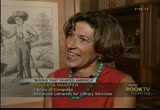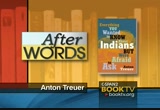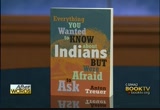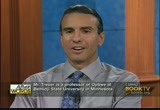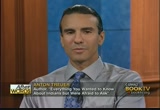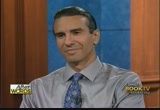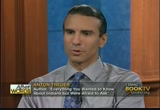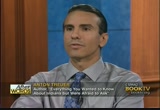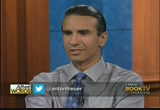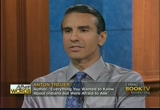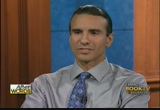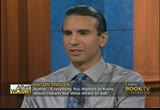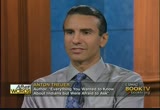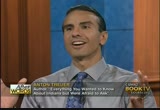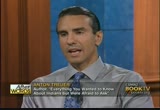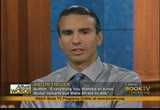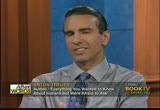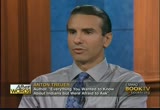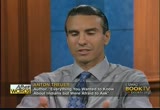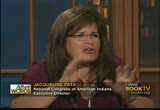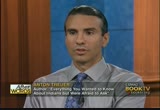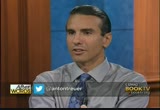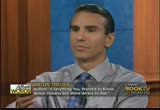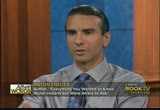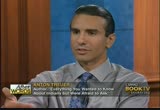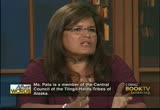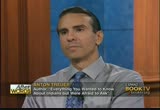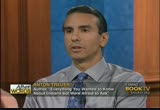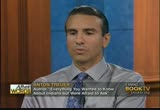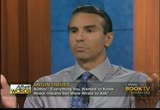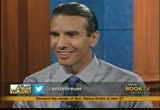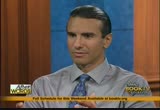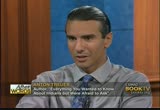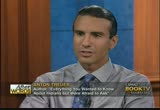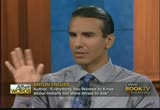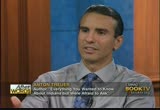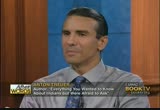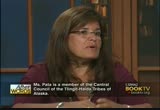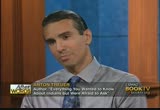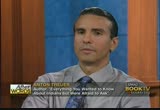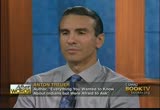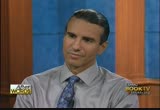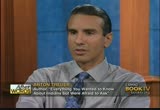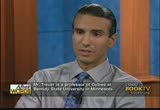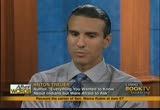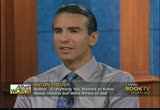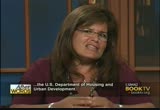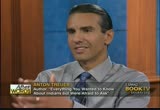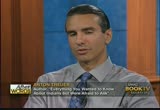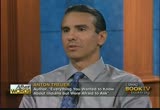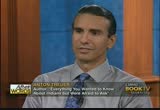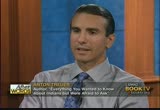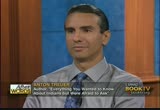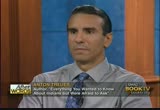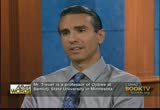tv Book TV After Words CSPAN September 16, 2012 9:00pm-10:00pm EDT
9:00 pm
of her house and a little tree, and it is made out of recycled materials. emily dickinson, of course, is fee nominal poet, we didn't know about her or discover her until the mid 1950s. when we finally were able to see her poems. or read her poems and love her poems unedited and in the way she written them. >> who is doing the edits. the professional editors. they like to make you conform. for emily that was an all awful con electrics. >> books that shaped america is the name of the exhibit. the library of congress is located at first of independents avenues in washington, d.c. right across the nation's capitol. ..
9:01 pm
as you answered in there. because in the beginning of my career when i started doing more things outside of just indian country and the audiences, i always tried to create a space for people to be able to ask any question they wanted to ask and make them feel comfortable. and you would get all sorts of
9:02 pm
questions. you know that the have been dying to ask those questions, so in your book to cover a lot of those questions, and i was glad to see that. in the beginning of the introduction key bachelet call yourself an ambassador. i thought maybe you could share a little bit with us about why ambassador command what you see your role in that, what made you prompted you to want to write this book? >> yeah, great question. i guess first of all it is horribly unfair that anyone should ever be an ambassador for their people and one of the issues that comes up especially with native american history and culture is that there is no such thing as the native of view. so it is a loaded question to see what do indians think about mascots, per capita payments or whatever. it's like saying what do they think about abortion, good or bad, and of course it's not that simple. there's a diversity of opinion. sometimes emotionally charged
9:03 pm
opinions about every issue t so on the one hand, no one represents the entire native of view so that's one of the most important disclaimers that i put in there as well. but at the same time, you know, i guess growing up in northern minnesota on the reservation and nearby in the town of ojibwe were half of a shopping position is native there were so many mean-spirited comments and misunderstandings from pierce and it seemed like the two worlds the native world and the nominated were also literally interacted attend kids on school trips 400 miles away from minneapolis driving around the reservation to get their. i felt like many kids and growing up i will go somewhere that has is a code with a
9:04 pm
population density bigger than the one that i came from coming and i will escapes this border land. and of course when i like to college i went to princeton university and i said i hope these guys are going to be educated and know something and the first question is where is your tomahawk. i thought well, the borderland follows me everywhere. and there was no way to escape it. but only a way through it. so, i realized there are not that -- i would be the barometer by which a lot of people would come in you know, understand or judge native people and issues and so i realized the importance of my own work in that representation. >> host: one thing i really like to get your buckles balance, and i think for me that's really important. i think that type of community is based upon balance. but in the book you had a lot of balance. dubow once the topics of going with sensitive issues that may be sensitive to the nominated person like coming you know, my cherokee grandmother -- my
9:05 pm
grandmother was a tricky princess, versus for the troubled comanche the issues are of a tribal membership and a moment. then you also dealt with tough issues like the history of christopher columbus. so there's that history lesson and in the enjoyment of reading the book. hal would you decide what to include and what not to include in this book? >> guest: for me actually writing the book happened a little faster than some of my research projects but building up all the questions and stuff has happened throughout my career i guess. as i have so many questions coming and i just kind of than keeping them in a shoebox and then sort them out into categories and try to figure out what would be the most important. what is one of the fun things about this book is you can sit next to the toilet and have a couple experiences and leave much enlightened but it's easy,
9:06 pm
accessible and approachable type of reading. but real answers, too. i think, you know, doing some bridge building is really critical work. and, a lot of the non-native people, you know, got their sugar coated version of christopher columbus in the first thanksgiving and very little else to feel like they need to know enough to know how to ask the question. and there's lots of guilt that when the issues are raised that inhibits a deeper conversation. and so a lot of native people and look at our history leaves a lot of people really understandably angry. so, being a guilty person and an angry person to have a deep meaningful conversation that's hard. and i think it is critical work. you know, for everyone in this country. you know, going to school and not getting answers and the teachers that got their sugar coated version of the first thanksgiving, too felt quick to
9:07 pm
address the subject that it's safer not to teach about indians because if you open your mouth you were going to offend somebody and all you need is one angry native parent breathing fire and your administrator and people retreat into their shells. as a result and if people never get the chance to learn about themselves and their school settings and a very rare even in the tribal schools which answer to curriculum standards and funding models that are really not that different from everyone else. they are all after the per pupil funding to be able to this. succumbing you know, to really create meaningful learning opportunities for native people and for them on the native people, critical stuff and there's a lot at state not suggest people can understand indian but really for the stability, longevity of our very firm of government and these are troubling times. but we live in. and you can lok across the
9:08 pm
world, you know, 77 kids killed in norway who are all children of political party members who are in favor of open immigration or france, another long established dhaka see that has now been altered vv grout wallen the muslim attire in the streets here in the united states where in arizona not only allows the racial profiling okay, but, you know, the laws that say if we are going to dismantle the ethnic studies across the board in the state of arizona. in the fall of the horrible this services it is not just the hispanics study pervez in tucson which was successfully dismantled, but it's also coming you know, for everybody. imagine the children in arizona now being prepared for some fantasy land that will never existence of the world in which the children will actually live and operate. and so, to me you know the sustainability of the democracy, the new political forum in the
9:09 pm
history of the world depends not upon the ability to assimilate, but the ability to support and enable things like cultural and linguistic diversity. >> host: you actually said this would be like a bathroom break i read it denies this is a but you can pick up. many times this section put it, carbon other section you didn't have to read it all the way through, and so that is one of the beauties of the book, too. one of the topics that you address is something that is the number one question i get from those people who are politically sensitive and racially sensitive and want to be doing the right thing but they just don't know how to call us american indians, with the census wants to call the aians. what is the right term, native american, first american, indigenous people?
9:10 pm
>> guest: this is one of the subject and this comes up with a lot of things in the book. there might be diversity of opinion. even within the indian country you will find some people who say, you know, columbus had it wrong. don't call me that. you know, i am a schiraldi or something like that. for myself i think it is far more important that we don't make everyone will come down on eggshells because having an angry disposition over something as simple as labels is a killer to, you know, the deeper understandings and it makes people shut down and not want to ask questions, not understand deeper and if they retreat from the subject matter and many people need to embrace deeper understandings and feel that it's safe to do that. and it's okay to do that. so, i kind of laid out of the prevailing terminology and just about all of them have some
9:11 pm
level of issue of problem. the term indian as christopher columbus thinking he was in china, japan, india, and that made it strands for into the european languages and stock. i guess on the one hand we consoles columbus for others. he didn't show up and say there are humans here. it had to be somewhat uttered and disempower so the whole colonial mentality was problematic. other terms can also be pretty ambiguous or confusing. you know, whether it is native if you say a native from minneapolis or minneapolis native does that mean a native american or someone that has lived there for their entire life. and so, you know, there is ambiguity, same as indigenous people to most parts of the world. and so there are some ambiguities, but there is an effort to find, you know,
9:12 pm
respectful ways to talk about things. in canada they've changed that terminology from their reserves to first nations to find emphasis in the united states on the nationhood on the troubled governments rather than on thinking of them just as cultural enclaves. certainly the tribal terms ourself referenced and they are always faced. at the same time it sounds a little centric to use the word for all 500 nations, so in the long run you have to find overarching terms as well to get on use them all fairly interchangeably but i think it should be the emphasis on having respect in an open mind if we do that. let's just get the conversation going.
9:13 pm
>> host: i agree with you about the respect principle. you know, at believe we've conducted in the polls on the attitude and knowledge of the american public and we think about the american people and our tribal governments, and, you know, it's interesting that most of the american public knowledge are not the indian country kind of ended with the public education experience so they know about christopher columbus, the known about pocahontas and thanksgiving, but they don't really know what is happening with try this today, and the more contemporary information. you've mentioned columbus a couple of times. let's just deal with the issues are not christopher columbus. every columbus day i get a call from the media people who say what are you doing today, what do you think about columbus day plaques the fact of the matter is most people on the indian country don't see christopher columbus as a hero. t want to share with us a little bit about that?
9:14 pm
>> guest: there's so much we could talk about on the entire conversation. i think it's critical to look at this history. i have been astounded that for the piece of history that goes so much about columbus kafta the newest journals and lots of letters, took trips to the americas, and then starting in the second trip there were lots of official scribes and army officials and all kinds of people doing lots of writing. missionaries. we know what happened. what astounds me is not just what happened, but 500 years after, we are still not really talking about what happened. the story is still so often sugar coated. and i think for example we know that there was a policy of genocide on columbus's second voyage, the spanish government instituted a gold dust tribute. all native people on the island that is now he and the dominican
9:15 pm
republic had to bring a certain amount of gold four times a year and she said to bring ten times as much. and with the spanish didn't really recognize is that most of the goals they had seen came to trade from mainland mexico and that was in espagnole under the ground not readily accessible so they couldn't meet the gold dust tribute. 30,000 people had their hands chopped off within 30 years to william inhabitants by the spanish estimates had been killed so it was the beginning of a genocide policy. we know this. but for some reason we are still teaching 1492 christopher columbus sailed the ocean blue, discovered a new world. how can you discover a place inhabited by other human beings? and open the door to this new world and set an example for us all. and even then, george bush the elder statesman of the 500th
9:16 pm
anniversary of columbus' used exactly those words, monumental, perseverance so bring the accomplishments of the great navigator and leader in her native people, even ones who don't know the entire history of columbus they just know there's something wrong with that perspective. this is part of human nature. no human being wants to be judged by their darkest day. no nation wants to be judged by their darkest day but when the nations have dark days, we have to acknowledge that. truth and reconciliation is the truth, and germany had to be a lot of work and and the nazi holocaust and the apologies reparations mandated instruction in the schools. it helps mitigate the chances of something like that happening again. here in the u.s. we have yet to
9:17 pm
get to seeing the first emerging effort of some kind of apology but, you know, we have yet to get to the widespread apologies, reparations, you know, mandated instructions come on little bits and pieces. i know wisconsin actually requires k-12 educators to take a class on the native history. you know, minnesota is trying to leave something into the curriculum strands. it's not nearly enough and the misunderstanding of people thinking these for all original casinos, some people thinking the scoring reservations. it's complicated and with the columbus narrative, too, that is exactly the case that there is so much to that story and there's so much of how we teach about it. with any of the subjects i remember one time asking a teacher what about the indians
9:18 pm
and the teacher said that this was your reviewer quito before, and i remember thinking that i'm here now. and in spite of it all come a lot of people have bet against native people over the last 500 years, the last and fill in the blank with the ever tried you want to talk out, in spite of it all we are still here. we still have the sovereign governments. we still have living languages. we still have for a vibrant cultural traditions and to me those are especially important. there's some really great material out there and contributes to setting the record straight you don't have to take the kindergartners to say color in the blood or
9:19 pm
something. to can start by talking about columbian exchange and how many of ideas and tools around agriculture, medicine, the ed city in scalpels of the presentation surgery introduced by native people to the rest of the world, tools and ideas still used today. those are good entry point for how native people have shaped the world. that's a good way to start. then when you get to the high schoolers you can lay it all out there and let them form their opinions. there's lots and lots to discuss. >> host: thanks. another topic you didn't start with in the look on the historical significance particularly for the indian country is that about the foundation for the tribal government today. you've discussed sovereignty and you talk about the treaties and reservations and there's a really important message for us today as they were then. can you tell us why it was important to include that and
9:20 pm
what is the lesson you wanted to teach the american public? >> guest: misunderstandings about so much. i think most americans are aware of the world is a diverse place but tend to look to the indian country as, you know, the cultural enclave. a cultural enclaves or sometimes a little bit more sophisticated understanding might be that there are a few different cultural enclaves without understanding the whole political dimension to what it means to be a tribal nation and there's a lot of things politically and legally cultural that make being a native very different from being ramesh or something like that where you have the distinct cultural enclaves even distant languages from immigrant groups that have been it's something measure the
9:21 pm
importance to everyone. really the most reliable source of help for native people in incredibly when we have 15% sustained unemployment rate of 15% in the united states. they call this the great depression. we've got social security, we've got the tennessee valley authority conservation corps, you know, medicare, medicaid, the huge mess of public intervention that is still here today. well, you know, way back before the casino the unemployment rate in the andean country was an average of 50%. and after the casino the rising tide didn't lift, they had dropped to around 20 plus% on average. so, there was an impact. but for native people but great
9:22 pm
depression started in the 1800's and it's never ended. we are still waiting for our intervention, and the only organization trying to alleviate the poverty hospitals programs run by the native nations and the experimented with literally terminating the tribal nationhood for the tribes like the menominee with the devastating consequences and there is a section but they had pioneered the sustainable forestry for the world and had actually built and endowment of $10 million at a time many tribal people are living in abject poverty and have a great program they were terminating the travel government coming and coming you know, the consequences are devastating for
9:23 pm
the sustainable program for the wealthy and benefits of the native people and the county then became the poorest county in the state of wisconsin and it costs the government more than the and then paying the subsidized government, and a lot of times that's been the problem with outsiders trying to figure out how to do something about the indian problem. they don't know what's best and the tribal government tends to know will get better. i think the native nationhood should be seen as critically important for everybody. when america came into existence it was through context, and america's sovereignty was not certain so they sought out the native allies and you might
9:24 pm
recall coming to valley forge and bringing food supplies and reinforcements to the colonial army at a critical juncture in the revolutionary war and the same with the war of 1812 for the sovereignty was being challenged again. as a result delete documents including the constitution has the specific mention of native people and they include things like the trade and intercourse walls where it says only congress shall regulate the trade and manage affairs with the states in the various indian tribes. what that means is, you know, state law and state governments don't have authority over those nations. they have a direct relationship with the u.s. federal. if the state has a law that says gaming and gambling is illegal
9:25 pm
except for church, those don't apply to the indian country but the of a part of the constitution is the treaty that says they are the supreme law of the land and as partial payments the native sovereignty has been affirmed to do something to the tribal sovereignty without doing something to the constitution and all those treaties. i think they would be pretty happy to do it because they've got lawyers now. >> the museum in the smithsonian did a nice display of the treaties in talking about the 400 plus treaties of america and how many they have broken.
9:26 pm
and i think it just really does create the environment and we are actually working as a government today. that we still have continued challenges and continue to go to congress for the policies are not in the in health care provision, education programs and other bases of that, but so the government on a little bit different, and we recognize that because we of the sovereignty, treaties and reservations. but we are also a little bit different, too and that is because we are sort of tied to the cultural customs, our traditions, our language that are clearly based upon who we are as people. you call yourself a language worrier commanded the but you spend a whole chapter on language, which we know how important this is. but why today as a modern-day indian do we care about language? >> great question. you know, to me of course this is one of my primary passions.
9:27 pm
but to me language and culture is one of the most important areas for us to focus on as the native people. it's a big part of what defines us, and of course a lot of native people didn't grow up speaking their tribal languages. through no fault of their own. there's been a long history with presidential boarding schools and various others immolation policies, and so i don't think native people should be gilted not what they didn't get to learn growing up for those who didn't grow up in the tribal languages although a lot of people did as well. but it raises fundamental questions about identity and cultural change. for a sample in minnesota where i come from, a third of the state's population of people of german heritage, and they've actually been living there for five generations now don't speak
9:28 pm
german and their german heritage and if they went to germany they might have a nice vacation but would feel most comfortable coming home to minnesota. in having german heritage and being. there's a difference between having the native heritage and being what our ancestors were. so it raises fundamental questions about how much can people change and still be the same people, still be recognizable to their ancestors of the tribal languages and the cultural customs but really critical work. if you look at some of the tribes that have been successful financially, the seminal for example really successful
9:29 pm
financially talking to some folks and said you've done with every country is trying to do. you have eliminated poverty for your enrolled citizen to the point had a budget shortfall in the state of florida in education in the tribal chairman said i feel your pain and donated to help alleviate the budget shortfall for the state of florida which got lots of love, and you know, political power. and they have accomplished a lot. but if you ask them okay then, what keeps you up at night, almost everyone i've talked to says language and cultural and this is my greatest concern for the tribal leadership today. i see them working so hard and with so much great integrity and they are claiming this mountain, and it is the mountain of economic prosperity and it's good to have our eye on that
9:30 pm
because poverty is a real issue in the indian country. this mountain of economic prosperity of empowerment because that is the vehicle by which they can do bigger and brighter things and my fear is there going to get off the mountain look around and say my god we just climbed the long mountain we should have been focusing on language and culture and it does define as in so many ways. i can speak more out this because that's what i know, but as a matter of perspective our word for an elder in the language literally means great being. our word for an elderly woman means one who holds things together describes the matriarch no wonder for the the ones to get a facelift and the talks in
9:31 pm
traction -- injection and admin touch they are you don't have to actually save respect your elders if you are saying it. it's built right in with every word you could possibly use. in many other ways, too mikey de r. dee that is involved in education, native or not need it is concerned about what they often call the achievement gap. but, to me the achievement gap is a misnomer. it is an opportunity gap. just as we were talking of christopher columbus coming you can look about every major entry point in the social studies curriculum and the major heroes to talked about, washington, lincoln, grant, jackson, the ones that are on all of the nominations of the currency with the exception of hamilton and franklin, they have all personally killed india, and they've engineer policies that have been genocidal, so my
9:32 pm
heroes are ot your heroes and that is a part of the disconnect. so too around language and so many other things. and i think a lot of times -- i do a lot of training for the k-12 educators because they're on the turnaround plan with no child left behind and trying to figure not how we address this achievement, and i will say look sometimes i'm in a school that has 90% or even 100% native kids let's take a walk around the school and amazingly there isn't even artwork that testifies to the existence of the race. you look in the books and what is being taught as predominantly not made it teachers teaching predominantly about coming you know, the worship of non-native people, and it's not the intent of those that design curriculum or teach it to marginalize people, but because they feel ill-equipped and they don't understand native people because they feel it is not okay to ask
9:33 pm
anything they want to know about indians that were afraid to ask, and nothing happened. as a result coming in, school is still in spite of all about assimilation. as a counter to example, you know, one of the shining stars and the need for education field, and there are some really great shining stars in schools that have been making them a child left behind and so forth, so when somebody gets that we should pay attention to that. but one of them is in the school which is actually based in reserve wisconsin. in spite of the fact the national average has been about 50% failure in the state mandated across much of the indian country and the charter's guidelines will do it in ojibwe.
9:34 pm
for 13 years in a row they've had a 100% rate on the state mandated tests in english and administered in english even though the teachers teach them exclusively in ojibwe. isn't that amazing? it goes to show learning something like a tribal languages not just about another pretty bird singing in the forest, it isn't just about appeasing the small sliver of the traditional minded native people, it's about what might be our most prospective tool to generate the academic achievement and the reasons are simple. but any kid to look for the one thing will keep them interested and involved in everything when it comes to education and for some it might be sports and music. whenever. but the access to culture does that. and it also shows that, you know, going to school and learning about the heroes of the world, not yours, all about the great civilization, all about
9:35 pm
these important things, none of which are yours. slowly but consistently engineers a powerful blow to the self-esteem, but burning about yourself as well as the rest of the world totally changes things. all the sudden appearance that have had a pretty negative experience with education, you look to the residential boarding schools most people have at least heard about education for assimilation, educators beating people for speaking the only language is the new, schools that kept cemeteries for the kids, but they hear about that and they don't really realize, you know, a lot of native people don't really feel comfortable in the parent teacher conversation our conference. don't really like the way some people got a negative experience it's like that. but, as the other ones of a
9:36 pm
sudden it turns that on its head it changes the education paradigm. they are getting everything else everyone else is except for the second language, and it builds trust and rapport and academic success. to me language is not just about the the language, it is about identity, educational accomplishments and success and, you know, another piece of this, too is that native people get to change over time. we don't just have to be frozen in time. one time i went with a friend to see dances with wolves and the response was your people have a beautiful culture. i didn't know what to say. i was thinking at first well -- but we are from the modern age and not from the plains and
9:37 pm
there are so many pieces and i think a lot of people just don't understand, they don't know where the entry point sar. so i think, you know, all of this fits together. the language and the culture and it's a tool box that is critical for us not just with education but with health. the indigenous population of new zealand and the revitalization have actually seen things like precipitous decline in the rate of participation of gangs and gang related violence, and to me that is really exciting. everyone is scratching their heads on education and. >> when you look at the indian country the impact you touched a little bit on the boarding schools and i would say that probably was one of the most single policies that happened to american indians that affected
9:38 pm
our academic achievements on so many levels. take one moment to explain what is the boarding school and what happened? >> it's a critical important piece to understanding how we got where we are not. there's a tendency in america for people to say this happened in the past. can't we just forget about it and move on. for most americans their experience has been one of disconnecting the motherland historical experience. so, it's hard to understand how this works. if someone is pounding you in the head with a hammer and says that all happened in the past, just forget about it, there is a portable wound -- portable wounded and it affects every facet of life comes of the
9:39 pm
experience is one of those pieces in the historical puzzle and the schools themselves were designed as a policy in the late 1800's, and the captain richard henry pratt of the first school of carlisle said our goal was to kill the indians in order to save the man and what he meant by that was this will be education for assimilation and the before and after pictures over just the physical makeover were astounding. one of our elders beckham said it's like your power and medicine. if we -- if someone had their brain and dropped off when they were young we would take a hot rocket and cauterize the wound so your medicine wouldn't leak out and you could imagine the kids coming to school and the first thing is a hair cut and a dramatic says rector away and burned. a must have been pretty
9:40 pm
traumatic. the education was compulsory. sometimes kids would go to school not just for a year or two, they would be sent a thousand miles from home and spent 12 years they're fostered in the summer months to the families, but the idea was to generate jobs for native people and how to assimilate into the mainstream society but no when he thought about basic things like this is america in the late 1800's and first half of the 1900's and there was a racial barrier to the game colin planet for people of color how do you learn how to parent. their parents did with lots of harsh physical discipline but without nurture.
9:41 pm
>> host: one of the things people realize is my mother went to boarding school, my husband's mother went to boarding school. we are not just talking about the 1800's, we are talking about the effect of the kentucky vision. estimate almost all of the grandparent generations have been through this experience, and in canada most of the parental generation has been to be started later and in did more recently. so, it is a big deal. and so many different types of damage to but i think the only way to heal that and so many of the other things we deal with in the indian country and then lots of tractors it has to do with truth and reconciliation. setting the record straight and providing opportunities for people to understand what happened, and then, you know, we can move on from there. south africa has done a lot of work country that reconciliation. canada is starting kuran in u.s. we still have work to do. and i am hoping that we can
9:42 pm
create some really good bridge building that will enable that to happen. >> host: i think we recognize the healing that happens in the country's, and something that we actually get recognized for on the spirituality. people identify and i love how you put it in the book. you made it seem so simple. i was raised by my elders and the first thing they teaches respect all things and everything in front of our face. in the book you talk about how we have a connection to our creator depending upon the formal term of the word and in this religious structure the
9:43 pm
pastor so if we disassociate from that religious activity or church, the religious experience doesn't end and we can feel connected still and recognize this person so religion is a very much a part of our everyday lives in our communities and who we are as people but we still have persecution for our religious practices. you mentioned that in the book in fact one of the phone calls that we get is those people who are incarcerated our military who are limited in their ability to practice their religion. how common is that and what are the challenges? >> guest: it is a common issue. i guess the first kind of disclaimer to put out there for a lot of people is that there is so much diversity in the faith traditions even, for example the red lake reservation in minnesota, one of the villages
9:44 pm
there has actually never had a church, never had a mission, has 100% traditional religious beliefs, they bury their dead in the front yard so there's always a grave houses and everyone's yard. it changes things so used about the door there's mom, dad, grand laconic and ploch mcminn back generations and makes it hard to sell the family farm in california so to speak so that connection to place is really deep and in fact that this for a lot of native people. on the same reservation across the lake at the village of the red lake there is a catholic mission in the church. the population is predominantly catholic. they are there for 90 years over two villages on the same reservation. so, you can have a real diversity of the traditions and experience. at the same time, i think regardless of the religious choice native people do have access to and are able to participate in different.
9:45 pm
some of the most beautiful and in power in parts of what it means to be native to those who are incarcerated, those who are for reasons having trouble accessing their command to spiritual leaders and things like that it is a challenge and issue and other needs to be recognition for the purposes, and equal access to them. some people are working hard to present opportunities and sometimes it is hard to find practitioners who are willing and able to go to those places. some might be incarcerated hundreds of miles from their home community or something. so there are some profound challenges there. but i think it is important work and it raises fundamental issues even about the prison systems in general. if you really want that to be about rehabilitation and providing better access is
9:46 pm
critical, and the native people sometimes it is a struggle in the indian country, just knowing who you are, finding your way, and creating the ease of access to those things are important. that is one of the things we did in the ceremony as i felt that is try to make it a point to even do things like translate because the ceremonies are exclusively in the tribal language, but a lot of people are not speakers so you want to make sure they can understand and absorb the content and the meaning of what is happening there and i've got is a working around those things is some of the most fulfilling and exciting work that we've for the young hunters and the coming-of-age ceremonies and the knowledge of the direction and all of those are important customs for my family and of course there are
9:47 pm
different specifics their money's for each tribe but it tends to be an open this before somebody goes fasting and it's a song or medicine and nobody really challenges that. they would be empowered directly by this course is greater than knous and so on really appreciate the way that anyone can be someone. >> host: for me it's important even though we don't live at home anymore in in washington, d.c., to be able to go home enough to keep that connectedness but also keep the practices would you that makes who we are. another part of the identity is something that we have to live with the tribal enrollment and membership but it's one of the questions that comes out because people are calling and asking how -- i think i have need of ancestors how do i find out what try lamb from and other people say i want to find out how i can
9:48 pm
collect my check or get my free education, thinking of those are really what they get but seriously, what kind of guidance to give to the folks that want to speak their native ancestry? >> it's a great question and one that very commonly comes up. i would say a couple things a lot of people have native ancestry in have been completely disconnected. you know, for a long time and effort of the native population has been fostered and adopted out to be the the have the right to reconnect. just because someone doesn't know who they are doesn't mean they should be turned away, so it's important to create opportunities for people to do that. at the same time, yeah, there is a lot of people coming you know, the identity piece is complicated. you know, if i said my great, great grandmother was an english princess even if she really is, just by saying that it means they are not saying i am an englishman nine disclaiming the
9:49 pm
connection. and sometimes that is the issue when someone is my great, great grandmother was a cherokee princess or something like that and they are always getting picked on more than anybody, but i guess the issue there is sometimes with that sort of statement some of my best friends are indians or whatever, it is using a connection with it be a friend or an ancient ancestral one as a way to say i'm not racist i am one of you so have native friends but don't use them as a badge to e alleviate some sort of guilt and if you have made it ancestry, find out about it and embrace it and learn about and connect revenues and does a bench or curiosity and if for those who do want to find out more, it is getting a lot easier. some tribes i know for example
9:50 pm
majeure landstuhl medish in northern minnesota for the land settlement is actually sophisticated genealogical records which are open and a lot of the tribes have been working on building up for themselves and have to keep careful records for other millman purposes. the other part to with the industry's toughest of the tribal enrollment. this is a contested issue in the indian country, and they're very strong on all sides of it. hinges upon this. citizenship in most nations across the world is determined by being born in that nation or applying for citizenship through an immigration process and often taking a citizenship test or something like that. in the andean countries, eligibility for the citizenship is determined by the proven percentage of blood from that tribe, and the problem is
9:51 pm
sometimes people have relatives from different reservations they might be 100% native but if they marry someone from a different tribe and their children are not eligible for citizenship that is how some people feel very strongly that it should be moved to the lineal descent. some people feel that they will be enrolling anybody that is ever seen and if we do that it will dilute the benefits and you have more outsiders not living on the reservation controlling the trouble politics so that is where this issue hinges upon i guess for myself i think we need to loosen up the tribal role and move more in the direction of the lineal descent. it's fine to require people to apply in person at the travel and all but office rather than by mail just hunting for the benefit or something like that. sometimes they are talking about things like the citizenship test and i think it is an interesting
9:52 pm
time, but a critical discussion. >> host: it's critical that they could be able to help us out. you also deal with something i want to call the teachable moments. we are trying to teach the public mom calls her husband and indian giver and i had to say but indian giving is in our traditional way and not in the other title you deal with in the book of osama bin laden and the geronimo and of course india is upset about that and demanding apologies and we try to use that as a mother teachable moment in the department of defense the there's a country dealing with this all over the place where the mascot issue so this question comes up a lot. would your message to that policy? >> there is so much to say. i think well, first of all the bottom line for me, not all native people feel the same, some people are trying to have
9:53 pm
made it mascot's but i think it's time for it to go. i think that we are slowly moving in that direction in spite of resistance to it and some days we will look back at the native americans mascots for sports teams for the segregated water fountains and how could that have ever been tolerated or defended. and i think the trend is to move in that direction and i think that is the direction to move. of course it is not happening yet formally everywhere. there's been more work done at the high school level and college level and professional sports. i have to do it with respect. if people feel they are honoring mothers or feel that they are not or feel they don't care, that doesn't matter. a lot of native people, not all but a lot of native people don't feel honored, the field as respected. even those that are trying to honor the opposing team's will
9:54 pm
necessarily defile their mascots in the name of team spirit so when there was a recent game in this past spring between the fighting and the bulldogs it was the opposing fannin chanting smallpox blanket, and nobody would say those statements are respectful helen i feel comfortable bringing my children to that game it's not just political pull correctness but there are alternatives lions and tigers and bears with skoda routt while i will hurt anybody or dishonor anybody of that stuff will go away and we can just focus on the sport and education at the schools and things would be much more important. to me it is a no-brainer that
9:55 pm
people are attached to their historical mascots and there has been resistance but the trend is to move in that direction even if you can find an indian who will support your mascot a lot of people won't switch this time to move on. >> host: the other thing i wanted to mention that this book does is it sets the groundwork for issues we're dealing with today politically so you have a section of tribes having their own police and courts and state governments. this will issue of jurisdiction is like one of the issues on the hill today dealing with violence against women and trying to figure out how can the tribal government the will to have jurisdiction to be able to protect women and children from perpetrators.
9:56 pm
another issue that you deal with as a foundational peace in your book is you talk about the welfare act and of the adoptions and the high number of children in foster care. we are waiting for this disk decision that is coming out about the indian child welfare but i think the people who are policy decision makers should read this book because it has those grounding principles with the origins of the issues we are dealing with today. as you are dealing with these what are those policies? what were you thinking when you included those within the book? what were your hopes? >> guest: a lot of people want indian studies, one to recover sovereignty work and what is the welford act? there is so much people don't understand. the lobby is complicated, indians are complicated and and
9:57 pm
trying to find a way to understand why we have casinos or something like that, but what the real nature of the legal framework in indian country is and how that affects the daily life is really important in a device like minnesota or the native people are born and a half percent of the state's population 17% of the state's prison population anonymity that cares about the basic human issues has got to be aware that native people need addressed and same thing with poverty behalf of the needed kids are in poverty, so there's a major thing people need to understand. succumb understanding the legal and political frameworks are critical pieces in that child
9:58 pm
welfare peace is also really huge. there's a recent piece on the national public radio about south dakota it's pretty horrifying. some states have done a better job than others, you know, about acknowledging the indian child welfare act and some of the tribes have pretty sophisticated contact, even the state governments that effect, you know, the county social service from ms and practices. but that is a critical area. >> host: one thing i think about the book and the shared vision program is that it shows you want to educate americans so they understand and know us better. i know that is a really important piece so that we can have more advocates outside of our own communities. one final question, will there be another book? >> guest: there's always something cooking. >> host: thank you. >> guest: thanks so much.
9:59 pm
>> that was "after words," booktv signature program in which authors of the latest nonfiction books are interviewed by journalists, public policy makers, legislators and others familiar with the material. "after words" errors every weekend on book tv at 10 p.m. on saturday, 12 p.m. and 9 p.m. on sunday and 12 a.m. on monday. you can also watch "after words" on line. go to booktv.org and click on the "after words" on the series and topics list on the upper right side of the page. ..
342 Views
IN COLLECTIONS
CSPAN2 Television Archive
Television Archive  Television Archive News Search Service
Television Archive News Search Service 
Uploaded by TV Archive on

 Live Music Archive
Live Music Archive Librivox Free Audio
Librivox Free Audio Metropolitan Museum
Metropolitan Museum Cleveland Museum of Art
Cleveland Museum of Art Internet Arcade
Internet Arcade Console Living Room
Console Living Room Books to Borrow
Books to Borrow Open Library
Open Library TV News
TV News Understanding 9/11
Understanding 9/11